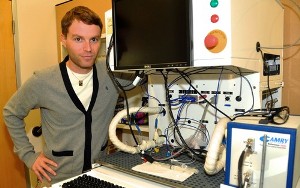Nov 4 2013
Powerful scanners that give scientists a direct line of sight into hydrogen fuel cells are the latest tools Simon Fraser University researchers will use to help Ballard Power Systems Inc. create more durable, lower-cost fuel cells. Using these fuel cells in vehicles can substantially reduce harmful emissions in the transportation sector.
 Erik Kjeang, director of SFU's Fuel Cell Research Lab, is the principal investigator of a research project in which scientists will be able to "see" directly inside fuel cells.
Erik Kjeang, director of SFU's Fuel Cell Research Lab, is the principal investigator of a research project in which scientists will be able to "see" directly inside fuel cells.
The new Nano X-ray Computed Tomography (NXCT) tools will become part of a nationally unique fuel-cell testing and characterization facility. The new four-year, $6.5-million project is receiving $3.39 million in funding from Automotive Partnership Canada (APC).
It’s one of 10 university-industry partnerships receiving a total of more than $52 million ($30 million from APC, leveraged by more than $22 million from industry and other partners) announced in October by the Natural Sciences and Engineering Research Council of Canada (NSERC).
Research carried out in the new visualization facility, expected to be operational by spring 2014, will further the ongoing research collaboration between Ballard and SFU.
“This will be an unprecedented, world-class testing facility dedicated entirely to this project over the next four years,” says principal investigator Erik Kjeang, an internationally known fuel-cell expert and director of SFU’s Fuel Cell Research Laboratory (FCRel). “Beyond its capabilities, that’s a strength in itself.”
Says Ballard’s Research Manager Shanna Knights: “It’s a unique opportunity, to have dedicated access to highly specialized equipment and access to university experts who are focused on Ballard’s needs.”
Researchers will use the facility to develop and advance the technology required for the company’s next generation of fuel cell products, helping to meet its targets related to extending fuel cell life while improving efficiency.
Kjeang, an assistant professor in SFU’s School of Mechatronic Systems Engineering, says researchers using the new, sophisticated nano-scale scanning capabilities will be able to see inside the fuel cell micro-structure and track how its components degrade over time. The research will play an important role in the university’s focus on advancing clean energy initiatives.
“Partnerships with leading companies such as Ballard solidify SFU's reputation as a world-class innovator in fuel cell research," says Nimal Rajapakse, dean and professor, Faculty of Applied Sciences.
"This unique fuel-cell testing facility will be used for cutting edge research and training of HQP (highly qualified personnel) that will help to strengthen the competitiveness of the Canadian automotive and clean energy industry. We are grateful that Automotive Partnership Canada has provided this second round of funding to support the SFU-Ballard research collaboration."
Adds Kjeang: “Thanks to the APC program, and the support NSERC has provided over the years, I have been able to both explore the fundamentals of fuel cell technology and to successfully work with companies who are making globally leading advances in green automotive technology.”
A former research engineer who began his career at Ballard in 2008, Kjeang came to SFU to continue his own research interests while keeping a foot in industry. He also continues to lead a complementary project with Ballard that involves nearly 40 students and researchers working to improve the durability of heavy-duty bus fuel cells.